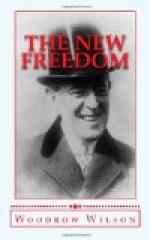No matter how often we think of it, the discovery of America must each time make a fresh appeal to our imaginations. For centuries, indeed from the beginning, the face of Europe had been turned toward the east. All the routes of trade, every impulse and energy, ran from west to east. The Atlantic lay at the world’s back-door. Then, suddenly, the conquest of Constantinople by the Turk closed the route to the Orient. Europe had either to face about or lack any outlet for her energies; the unknown sea at the west at last was ventured upon, and the earth learned that it was twice as big as it had thought. Columbus did not find, as he had expected, the civilization of Cathay; he found an empty continent. In that part of the world, upon that new-found half of the globe, mankind, late in its history, was thus afforded an opportunity to set up a new civilization; here it was strangely privileged to make a new human experiment.
Never can that moment of unique opportunity fail to excite the emotion of all who consider its strangeness and richness; a thousand fanciful histories of the earth might be contrived without the imagination daring to conceive such a romance as the hiding away of half the globe until the fulness of time had come for a new start in civilization. A mere sea captain’s ambition to trace a new trade route gave way to a moral adventure for humanity. The race was to found a new order here on this delectable land, which no man approached without receiving, as the old voyagers relate, you remember, sweet airs out of woods aflame with flowers and murmurous with the sound of pellucid waters. The hemisphere lay waiting to be touched with life,—life from the old centres of living, surely, but cleansed of defilement, and cured of weariness, so as to be fit for the virgin purity of a new bride. The whole thing springs into the imagination like a wonderful vision, an exquisite marvel which once only in all history could be vouchsafed.
One other thing only compares with it; only one other thing touches the springs of emotion as does the picture of the ships of Columbus drawing near the bright shores,—and that is the thought of the choke in the throat of the immigrant of to-day as he gazes from the steerage deck at the land where he has been taught to believe he in his turn shall find an earthly paradise, where, a free man, he shall forget the heartaches of the old life, and enter into the fulfilment of the hope of the world. For has not every ship that has pointed her prow westward borne hither the hopes of generation after generation of the oppressed of other lands? How always have men’s hearts beat as they saw the coast of America rise to their view! How it has always seemed to them that the dweller there would at last be rid of kings, of privileged classes, and of all those bonds which had kept men depressed and helpless, and would there realize the full fruition of his sense of honest manhood, would there be one of a great body of brothers, not seeking to defraud and deceive one another, but seeking to accomplish the general good!




